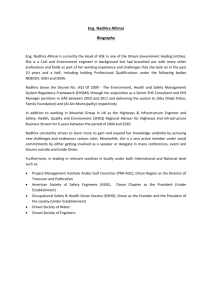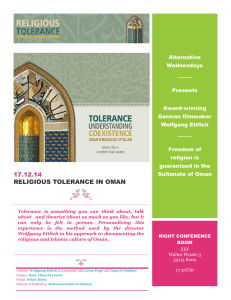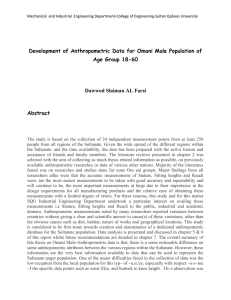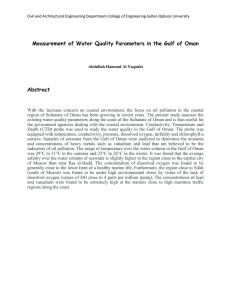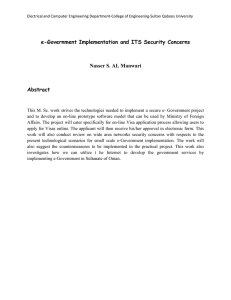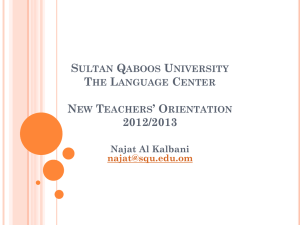26 H
advertisement
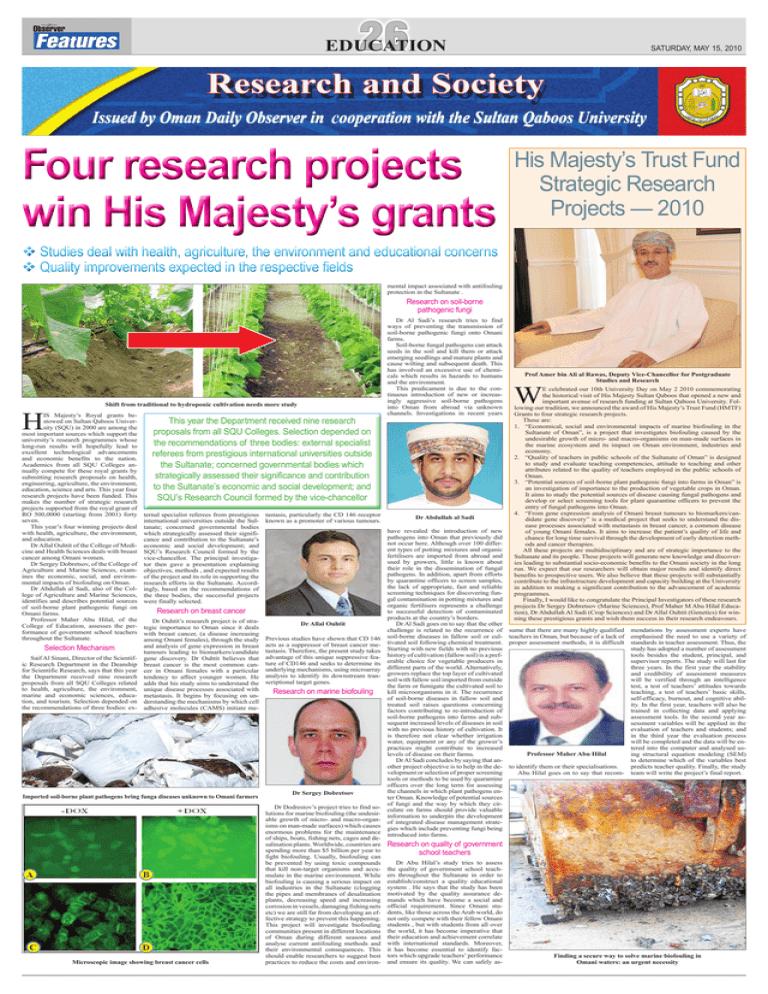
26 education Four research projects win His Majesty’s grants SATURday, MAY 15, 2010 His Majesty’s Trust Fund Strategic Research Projects — 2010 Studies deal with health, agriculture, the environment and educational concerns Quality improvements expected in the respective fields mental impact associated with antifouling protection in the Sultanate . Research on soil-borne pathogenic fungi H Shift from traditional to hydroponic cultivation needs more study is Majesty’s Royal grants bestowed on Sultan Qaboos University (SQU) in 2000 are among the most important sources which support the university’s research programmes whose long-run results will hopefully lead to excellent technological advancements and economic benefits to the nation. Academics from all SQU Colleges annually compete for these royal grants by submitting research proposals on health, engineering, agriculture, the environment, education, science and arts. This year four research projects have been funded. This makes the number of strategic research projects supported from the royal grant of RO 500,0000 (starting from 2001) forty seven. This year’s four winning projects deal with health, agriculture, the environment, and education. Dr Allal Ouhtit of the College of Medicine and Health Sciences deals with breast cancer among Omani women. Dr Sergey Dobretsov, of the College of Agriculture and Marine Sciences, examines the economic, social, and environmental impacts of biofouling on Oman. Dr Abdullah al Sadi, also of the College of Agriculture and Marine Sciences, identifies and describes potential sources of soil-borne plant pathogenic fungi on Omani farms. Professor Maher Abu Hilal, of the College of Education, assesses the performance of government school teachers throughout the Sultanate. Selection Mechanism Saif Al Sinani, Director of the Scientific Research Department in the Deanship for Scientific Research, says that this year the Department received nine research proposals from all SQU Colleges related to health, agriculture, the environment, marine and economic sciences, education, and tourism. Selection depended on the recommendations of three bodies: ex- This year the Department received nine research proposals from all SQU Colleges. Selection depended on the recommendations of three bodies: external specialist referees from prestigious international universities outside the Sultanate; concerned governmental bodies which strategically assessed their significance and contribution to the Sultanate’s economic and social development; and SQU’s Research Council formed by the vice-chancellor ternal specialist referees from prestigious tastasis, particularly the CD 146 receptor international universities outside the Sul- known as a promoter of various tumours. tanate; concerned governmental bodies which strategically assessed their significance and contribution to the Sultanate’s economic and social development; and SQU’s Research Council formed by the vice-chancellor. The principal investigator then gave a presentation explaining objectives, methods , and expected results of the project and its role in supporting the research efforts in the Sultanate. Accordingly, based on the recommendations of the three bodies, the successful projects were finally selected. Research on breast cancer Dr Ouhtit’s research project is of strategic importance to Oman since it deals with breast cancer, (a disease increasing among Omani females), through the study and analysis of gene expression in breast tumours leading to biomarkers/candidate gene discovery. Dr Ouhtit believes that breast cancer is the most common cancer in Omani females with a particular tendency to affect younger women. He adds that his study aims to understand the unique disease processes associated with metastasis. It begins by focusing on understanding the mechanisms by which cell adhesive molecules (CAMS) initiate me- Imported soil-borne plant pathogens bring funga diseases unknown to Omani farmers Microscopic image showing breast cancer cells Dr Allal Ouhtit Previous studies have shown that CD 146 acts as a suppressor of breast cancer metastasis. Therefore, the present study takes advantage of this unique suppressive feature of CD146 and seeks to determine its underlying mechanisms, using microarray analysis to identify its downstream transcriptional target genes. Research on marine biofouling Dr Sergey Dobretsov Dr Dodrestov’s project tries to find solutions for marine biofouling (the undesirable growth of micro- and macro-organisms on man-made surfaces) which causes enormous problems for the maintenance of ships, boats, fishing nets, cages and desalination plants. Worldwide, countries are spending more than $5 billion per year to fight biofouling. Usually, biofouling can be prevented by using toxic compounds that kill non-target organisms and accumulate in the marine environment. While biofouling is causing a serious impact on all industries in the Sultanate (clogging the pipes and membranes of desalination plants, decreasing speed and increasing corrosion in vessels, damaging fishing nets etc) we are still far from developing an effective strategy to prevent this happening. This project will investigate biofouling communities present in different locations of Oman during different seasons and analyse current antifouling methods and their environmental consequences. This should enable researchers to suggest best practices to reduce the costs and environ- Dr Al Sadi’s research tries to find ways of preventing the transmission of soil-borne pathogenic fungi onto Omani farms. Soil-borne fungal pathogens can attack seeds in the soil and kill them or attack emerging seedlings and mature plants and cause wilting and subsequent death. This has involved an excessive use of chemicals which results in hazards to humans and the environment. This predicament is due to the continuous introduction of new or increasingly aggressive soil-borne pathogens into Oman from abroad via unknown channels. Investigations in recent years Dr Abdullah al Sadi have revealed the introduction of new pathogens into Oman that previously did not occur here. Although over 100 different types of potting mixtures and organic fertilisers are imported from abroad and used by growers, little is known about their role in the dissemination of fungal pathogens. In addition, apart from efforts by quarantine officers to screen samples, the lack of appropriate, fast and reliable screening techniques for discovering fungal contamination in potting mixtures and organic fertilisers represents a challenge to successful detection of contaminated products at the country’s borders. Dr Al Sadi goes on to say that the other challenge is related to the recurrence of soil-borne diseases in fallow soil or cultivated soil following chemical treatment. Starting with new fields with no previous history of cultivation (fallow soil) is a preferable choice for vegetable producers in different parts of the world. Alternatively, growers replace the top layer of cultivated soil with fallow soil imported from outside the farm or fumigate the cultivated soil to kill microorganisms in it. The recurrence of soil-borne diseases in fallow soil and treated soil raises questions concerning factors contributing to re-introduction of soil-borne pathogens into farms and subsequent increased levels of diseases in soil with no previous history of cultivation. It is therefore not clear whether irrigation water, equipment or any of the grower’s practices might contribute to increased levels of disease on their farms. Dr Al Sadi concludes by saying that another project objective is to help in the development or selection of proper screening tools or methods to be used by quarantine officers over the long term for assessing the channels in which plant pathogens enter Oman. Knowledge of potential sources of fungi and the way by which they circulate on farms should provide valuable information to underpin the development of integrated disease management strategies which include preventing fungi being introduced into farms. Prof Amer bin Ali al Rawas, Deputy Vice-Chancellor for Postgraduate Studies and Research W e celebrated our 10th University Day on May 2 2010 commemorating the historical visit of His Majesty Sultan Qaboos that opened a new and important avenue of research funding at Sultan Qaboos University. Following our tradition, we announced the award of His Majesty’s Trust Fund (HMTF) Grants to four strategic research projects. These are: 1. “Economical, social and environmental impacts of marine biofouling in the Sultanate of Oman”, is a project that investigates biofouling caused by the undesirable growth of micro- and macro-organisms on man-made surfaces in the marine ecosystem and its impact on Oman environment, industries and economy. 2. “Quality of teachers in public schools of the Sultanate of Oman” is designed to study and evaluate teaching competencies, attitude to teaching and other attributes related to the quality of teachers employed in the public schools of Oman. 3. “Potential sources of soil-borne plant pathogenic fungi into farms in Oman” is an investigation of importance to the production of vegetable crops in Oman. It aims to study the potential sources of disease causing fungal pathogens and develop or select screening tools for plant quarantine officers to prevent the entry of fungal pathogens into Oman. 4. “From gene expression analysis of Omani breast tumours to biomarkers/candidate gene discovery” is a medical project that seeks to understand the disease processes associated with metastasis in breast cancer, a common disease of young Omani females. It aims to increase the patient’s quality of life and chance for long time survival through the development of early detection methods and cancer therapies. All these projects are multidisciplinary and are of strategic importance to the Sultanate and its people. These projects will generate new knowledge and discoveries leading to substantial socio-economic benefits to the Omani society in the long run. We expect that our researchers will obtain major results and identify direct benefits to prospective users. We also believe that these projects will substantially contribute to the infrastructure development and capacity building at the University in addition to making a significant contribution to the advancement of academic programmes. Finally, I would like to congratulate the Principal Investigators of these research projects Dr Sergey Dobretsov (Marine Sciences), Prof Maher M Abu Hilal Education), Dr Abdullah Al Sadi (Crop Sciences) and Dr Allal Ouhtit (Genetics) for winning these prestigious grants and wish them success in their research endeavours. sume that there are many highly qualified mendations by assessment experts have teachers in Oman, but because of a lack of emphasised the need to use a variety of proper assessment methods, it is difficult standards in teacher assessment. Thus, the study has adopted a number of assessment tools besides the student, principal, and supervisor reports. The study will last for three years. In the first year the stability and credibility of assessment measures will be verified through an intelligence test, a test of teachers’ attitudes towards teaching, a test of teachers’ basic skills, self-efficacy, burnout, and cognitive ability. In the first year, teachers will also be trained in collecting data and applying assessment tools. In the second year assessment variables will be applied in the evaluation of teachers and students; and in the third year the evaluation process will be completed and the data will be entered into the computer and analysed usProfessor Maher Abu Hilal ing structural equation modeling (SEM) to determine which of the variables best to identify them or their specialisations. predicts teacher quality. Finally, the study Abu Hilal goes on to say that recom- team will write the project’s final report. Research on quality of government school teachers Dr Abu Hilal’s study tries to assess the quality of government school teachers throughout the Sultanate in order to establish/construct a quality educational system . He says that the study has been motivated by the quality assurance demands which have become a social and official requirement. Since Omani students, like those across the Arab world, do not only compete with their fellow Omani students , but with students from all over the world, it has become imperative that their education and achievement correlate with international standards. Moreover, it has become essential to identify factors which upgrade teachers’ performance and ensure its quality. We can safely as- Finding a secure way to solve marine biofouling in Omani waters: an urgent necessity
